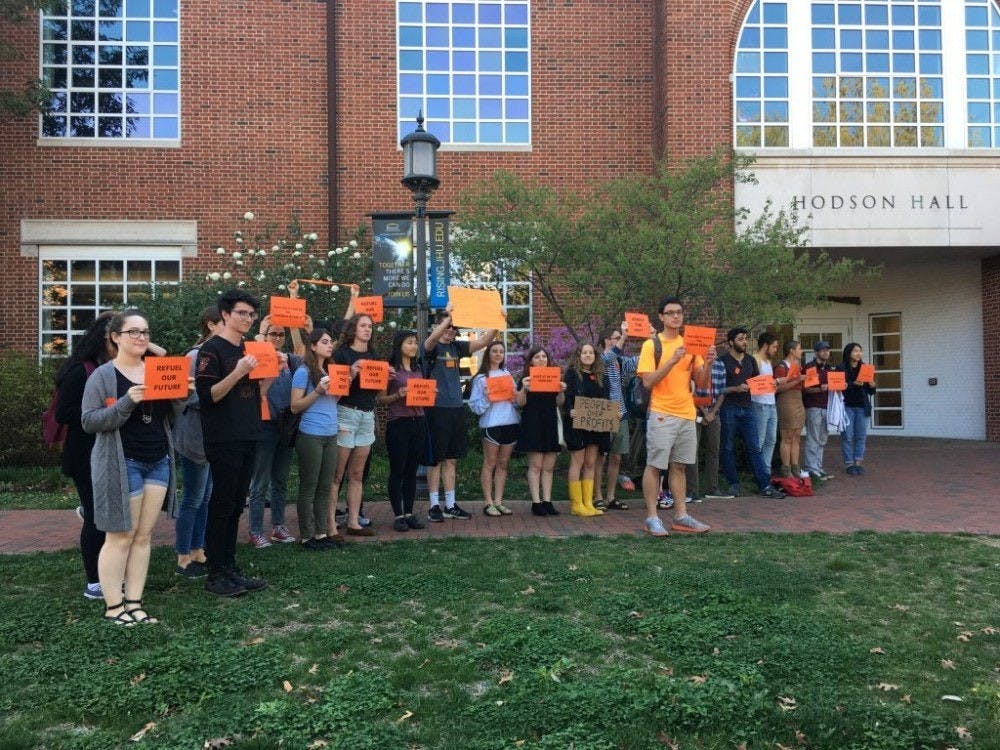The Student Government Association (SGA) released a referendum on Oct. 6 with several propositions for the student body to vote on. Students are asked to vote “yes” or “no” on eight major issues and concerns raised at Hopkins over recent years.
The referendum has gathered 1,139 responses as of Wednesday, Oct. 17. Tentatively, SGA plans on keeping the referendum open until the end of November or until each proposition receives a minimum number of votes. This minimum threshold varies for each proposition and is determined by two factors: how many students answer that question and what proportion of those students answer “yes.”
The minimum threshold numbers are subject to change based on these two factors. As of now, the lowest threshold is 2,000 votes, and the highest requires 3,000 — a proposition that meets its threshold will pass.
SGA Executive Secretary Aspen Williams explained that if a proposition passes, SGA is bound to work toward the position it specifieswhether may approach administration or work with student leaders to do so.
“A lot of the work we do is sustained advocacy, so we might not see the changes in the next two years,“ Williams said. “Our job is helping to put in place systems that are going to serve students in the future in ways that we know would have served us if the systems had been in place before us.”
SGA Executive Vice President AJ Tsang explained that in the context of the national midterm elections, it is particularly important for students to feel as if their voices are heard and valued.
“The referendum represents our way to say that our voice matters as students and as young people,“ he said. “No matter what conditions may be like nationally, we still have the chance to affect decisions on the most local level near and dear to us.”
Over the summer, SGA released a petition to determine the student body’s level of interest in a potential referendum. The petition asked students first, if they were interested in having a referendum at all and second, what issues they would like to see addressed.
After the petition gathered 900 signatures, SGA concluded that the student body was interested in a future petition.
Williams detailed the process of creating the referendum and determining which questions it would address. By statistically analyzing the issues that students had indicated their interest in during the initial petitioning period, SGA determined which issues were most important to the student body.
By Sept. 20, SGA finalized the eight propositions that they planned on seeking students’ opinions about. SGA’s Internal Affairs Committee wrote arguments against and in favor of each proposition that students could potentially use to make their decisions.
These propositions addressed: private police; fossil fuel divestment; building a new student center; mental health; sexual violence investigations; bringing covered grades back; adding an undergraduate observer to the Board of Trustees; and amending the SGA constitution.
Williams explained that SGA wanted to include a proposition aimed at changing its own internal functioning, primarily by increasing the number of student representatives who would serve on the Senate.
“We need more bandwidth,” Williams said. “SGA is doing a lot of work to make sure students are represented on all levels of administrative bodies, and it is difficult to do that with the number of senators we have right now... Having more representatives allows us to better represent the student body so there are more people who are democratically voted in.”
Tsang described how data from the referendum would allow SGA to show the University administration that these stances had tangible student support, citing the example of a potential new student center.
“No administrator has told us in the past year that they are opposed to the student center. The main question that everyone has is: How are we going to raise the money?” he said. “Administrators have so many projects to do in any given time, [so] we feel like as students, it’s our job to step up to the plate and provide that plan for the University.”
Junior Sara Nutter expressed her support of the proposition to add an undergraduate observer to the Board of Trustees.
“SGA has a much smaller role than they could potentially have,“ she said. “But, hopefully, if the referendum goes through and if they are able to get a student representative on the Board of Trustees, they might have a larger role in amplifying the role of the students.”
While junior Amelia Breen believes that the referendum is a good idea, she is unsure about how it will be realistically implemented.
“It opens the dialogue for more power for SGA, but I do not think it necessitates that that would happen either,” she said.
Junior Paula Granston agreed, adding that compared to the administration, SGA had a limited role.
“At the end of the day, the people on the Board and the adults who are actually running the University will make their final decision no matter what — based on money, personal interests or pressure from some outside entity,” she said.
She expressed doubts as to whether or not the referendum could have lasting consequences that positively impact the student body.
“It’s good to at least have the illusion of student participation,“ Granston said. “But in terms of our input actually being implemented, I doubt that.”
Nutter, however, argued that the referendum was impactful regardless of the consequences.
“It gives students the opportunity to weigh in on different policies that the University may or may not take and just give students a voice,” she said.
SGA plans on promoting the referendum over social media and by frequently tabling in popular locations like Brody, the FFC and Nolan’s until the end of November. By doing so, both Tsang and Williams hope that each proposition on the referendum will be able to achieve its minimum vote threshold.





